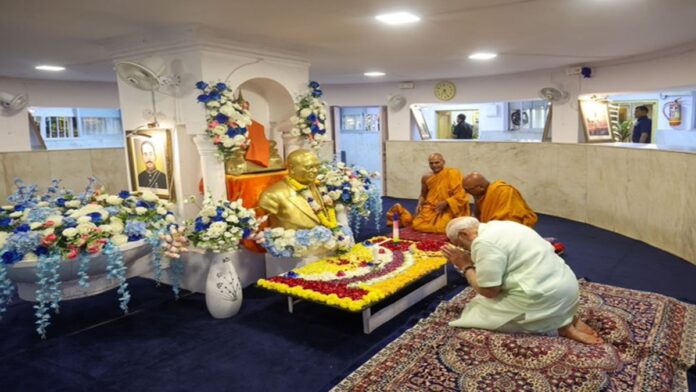Prime Minister Narendra Modi paid homage to Dr. BR Ambedkar at the Parliament House Lawns on the occasion of the 69th Mahaparinirvan Diwas.
Taking to X, PM Modi expressed reverence for Ambedkar’s contributions to the Indian Constitution and his relentless efforts toward social justice.
“On Mahaparinirvan Diwas, we bow to Dr. Babasaheb Ambedkar, the architect of our Constitution and a beacon of social justice. Dr. Ambedkar’s tireless fight for equality and human dignity continues to inspire generations. Today, as we remember his contributions, we also reiterate our commitment to fulfilling his vision. Also sharing a picture from my visit to Chaitya Bhoomi in Mumbai earlier this year. Jai Bhim!”
Tribute by Dignitaries
Vice President Jagdeep Dhankhar, Former President Ram Nath Kovind, Congress President Mallikarjun Kharge, and Lok Sabha Speaker Om Birla were among the leaders who paid their respects at the Parliament House Lawns. A notable moment of camaraderie was observed as PM Modi and Congress President Mallikarjun Kharge were seen holding hands during the occasion.
Significance of Mahaparinirvan Diwas
Mahaparinirvan Diwas, observed annually on December 6, marks the death anniversary of Dr. Bhimrao Ramji Ambedkar, fondly known as Babasaheb Ambedkar. The chief architect of the Indian Constitution, Ambedkar dedicated his life to fighting caste-based discrimination, advocating for Dalit rights, and championing equality for all.
Born on April 14, 1891, Ambedkar was a multifaceted personality — a jurist, economist, politician, and social reformer. His transformative work has left an indelible mark on India’s social and political fabric. In 1990, he was posthumously awarded the Bharat Ratna, India’s highest civilian honor.
The term “Mahaparinirvan” originates from Buddhist teachings, referring to liberation from the cycle of life and death. The day serves as a solemn occasion to honor Ambedkar’s enduring legacy and his profound influence on modern India.
Historical Context
Dr. Ambedkar passed away on December 6, 1956, at his residence in Delhi. He was one of the seven members of the committee responsible for drafting the Indian Constitution after independence. His contributions continue to inspire the nation in its journey toward social equity and justice.


